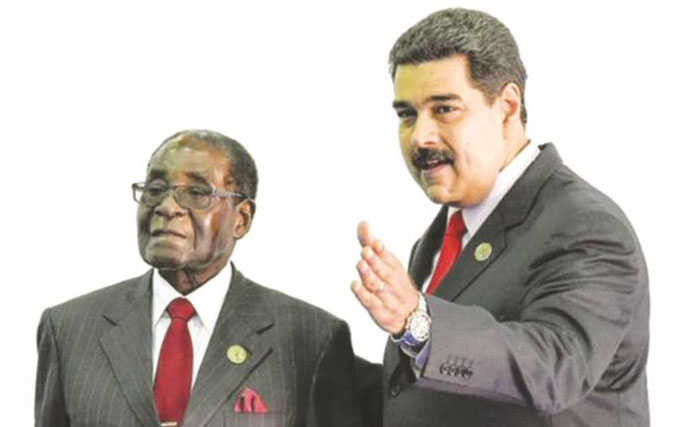Same script from Venezuela to Zim


President Mugabe with his Venezuelan counterpart Nicolas Maduro, who is currently facing a backlash from Washington
MY TURN WITH TICHAONA ZINDOGA
The script reads the same.
It is acted out by characters fitting into certain roles: the good and the bad guys.
And the gods.
The reader may have been following what is happening in the South American country called Venezuela, a resource-rich piece of earth that has for years been subject of envy from Western countries.
Venezuela has a long history of colonialism.
The first colonial power was Spain.
We are told that Spanish expeditions led by Columbus and Alonso de Ojeda reached the coast of present-day Venezuela in 1498 and 1499.
Spain established its first permanent South American settlement in the present-day city of Cumaná in 1522, and in 1577 Caracas became the capital of the Province of Venezuela.
Venezuela’s struggle for independence began in 1810 while Spain was engaged in the Peninsular War .
The Venezuelan War of Independence yielded the independence of the Republic Gran Colombia in 1821 under the leadership of Simón Bolívar, and Venezuela separated from that Republic in 1830.
Then Americans came in. The USA anchored its policy on two philosophies, namely the Monroe Doctrine of December 2 , 1823 , and the Roosevelt Corollary to the Monroe Doctrine of December 6, 1904 which one Cort Greene describes as “the bedrocks of expansionism and intervention which has caused so much misery, death and impoverishment for millions across Latin America”.
Explains Greene: “The Monroe Doctrine was created to project the United States’ sphere of influence into the Americas and fill the void left by Spain. It was also due to the upstart nation’s fear of Latin American colonisation by other more powerful European imperialists. In short, they saw Latin America as their own ‘backyard’ and field for exploitation.”
Further Greene explains to us: “Roosevelt ’s Corollary, in an address to Congress, became an amendment to the Monroe Doctrine which launched the era of the US as an international police force through the use of its infamous ‘big stick’. This opened the bloody history of US involvement on a grand scale, which haunts the peoples of the region and the world to this day.
“Though it has gone through many ideological contortions including ‘dollar diplomacy’, the ‘good neighbour’ policy , the ‘Reagan Doctrine’ and most recently , the ‘Bush Doctrine’ content has remained the same .”
In the intervening period, we have the 1970s’ issues in which America bared its imperialism and started countless wars and set off meddling and all kind of interventions.
The 1990s saw the rise of Hugo Chavez in Venezuela and he began his socialist project and independence movement that was inspired by the philosophy of Simon Bolivar.
Chavez himself became a phenomenon.
His followers called themselves Chavistas.
We are Chavez.
He was a pain in the backside of America, rising from a military to a democratic leader who had the backing of an overwhelming majority of his people.
He survived the machinations of the US from a military coup to subversion through NGOs and sponsored opposition.
Chavez lost his own war to cancer.
He died in 2013.
Nicolas Maduro, a military strongman, was his anointed successor.
Maduro rode straight into the maelstrom that is Venezuela.
Maduro is no Chavez.
Maduro is facing a lot of trouble as there have been protests and strong opposition to his rule.
Protests are getting stronger by the day and Maduro is hanging in just there: last July he won crucial elections for the National Assembly.
Yet, somehow, his opponents who are driven by America believe he can be toppled.
The economy is the Achilles heel. The US has been imposing sanctions and restrictions on Venezuela and its economy.
Venezuela is dependent on oil, which it nationalised, along with key sectors. America has been trying to bring the economy of Venezuela down, along with Maduro and the socialist experiment.
A few days ago the Washington Post was rubbing its hand in this imperialist glee. “In Venezuela, the economy may do what the opposition failed to do,” the paper announced.
The story is very instructive.
Zimbabweans will completely relate
Which is the point of this piece, anyway, as we draw key lessons and parallels. The US does not want elections that do not accord with its wishes.
Hence, the Washington Post views the last election in Venezuela as “an internationally condemned election last month (that) created an all- powerful Congress loyal to Maduro”.
Predictably there have been economic consequences for that unwanted result. We are told that the bolívar (Venezuela’s currency), has fluctuated more wildly than ever, a significant feat for a country saddled with the world’ s highest inflation rate.
According to Wapo, street prices for staples such as bread and tomatoes have doubled in less than two weeks.
“The spiralling economic crisis is sending a fresh jolt of panic through crisis-hardened Venezuelans, who are increasingly blaming Maduro,” helpfully notes the paper, roping in a voice that tells us that: “It was after the vote that things went out of control.”
It’s like the people of Venezuela are paying g dearly for their political choices.
Actually, they are!
Sounds familiar?
Here is the Washington Post again, quoting an expert:
“His (Maduro’s) regime, like [ Robert ] Mugabe in Zimbabwe and [ Bashar al- ] Assad in Syria , has already managed to survive an imploding economy, and I don’t know that a worse economic performance will do him in. ”
The pundit saw an opposition uprising, or at least being even more galvanised, on the back of these hardships.
He hoped that internet would be used to mobilise people. Meanwhile, the US has said it has the “military option” regarding Venezuela, meaning that if the political forces and sanctions come short, President Donald J. Trump would make use of his army to get rid of Maduro and his “regime”.
It all sounds scary.
And familiar.
The script that America is using in Venezuela is so identical to the one America and its Western allies have been using on Zimbabwe.
By the way, America waded into the Zimbabwe issue apparently to fill in the void left by a waning Britain that Zimbabwe effectively defeated when we embarked on the land reform programme in 2000.
And it feared that Zimbabwe could fall under the influence of new players such as China and Russia.
Just like 19th century South America.
The script reads the same.









Comments